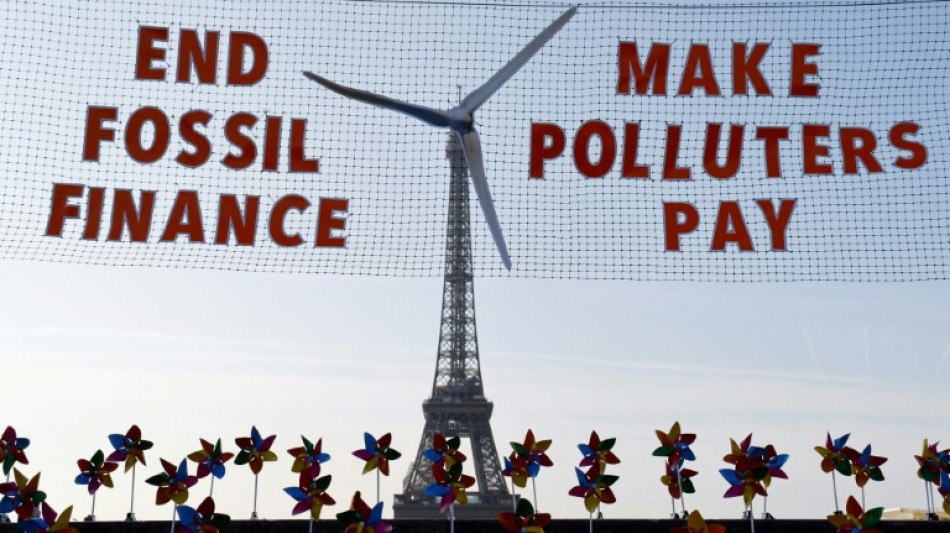
Paris climate summit opens with call for 'finance shock'

French President Emmanuel Macron told global leaders Thursday that no country should have to choose between tackling poverty and dealing with climate change at a summit tasked with reimagining the world's financial system.
The Summit for a New Global Financial Pact is aimed at finding the financial solutions to the interlinked global goals of tackling poverty, curbing planet-heating emissions and protecting nature.
In his opening remarks Macron told delegates that the world needs "public finance shock" to fight these challenges, adding the current system was not well suited to address the world's challenges.
"Policymakers and countries shouldn't ever have to choose between reducing poverty and protecting the planet," Macron said.
Ugandan climate campaigner Vanessa Nakate took the podium after Macron and asked the audience, which included oil-rich Saudi Arabia's Crown Prince Mohammed bin Salman, to take a minute of silence for people who are suffering from disasters.
She slammed the fossil fuel industry, saying they promise development for poor communities but the energy goes elsewhere and the profits "lie in the pockets of those who are already extremely rich".
"It seems there is plenty of money, so please do not tell us that we have to accept toxic air and barren fields and poisoned water so that we can have development," she said.
Economies have been battered by successive crises in recent years, including Covid-19, Russia's invasion of Ukraine, spiking inflation, debt, and the spiralling cost of weather disasters intensified by global warming.
Leaders attending the summit include Barbados Prime Minister Mia Mottley, who has become a powerful advocate for reimagining the role of the World Bank and International Monetary Fund in an era of climate crisis.
Kenyan President William Ruto will "underscore the urgent need to move beyond incremental measures that fall short of effectively combating the climate crisis and fail to generate investment benefits for Africa", his office said.
Other participants include UN Secretary-General Antonio Guterres, US Treasury Secretary Janet Yellen, IMF director Kristalina Georgieva and World Bank chief Ajay Banga.
- Climate goals -
France says the two-day summit will be a platform for ideas before a cluster of major economic and climate meetings this year.
But observers are looking for tangible progress -- including keeping promises already made.
"We'd need to see some down payments from the richer countries and their development finance institutions," said Alex Scott of the think tank E3G.
One likely announcement is that a 2009 pledge to deliver $100 billion a year in climate finance to poorer nations by 2020 will belatedly be fulfilled.
A second pledge to rechannel $100 billion in unused "special drawing rights" (SDRs) -- the IMF's tool to boost liquidity -- will also be in the spotlight.
Yellen said the United States would use the summit to push for creditors to grant relief and restructure debts of developing countries.
"The international community must come together to support countries that are currently in crisis," she told a news conference.
China, a major global creditor, has come under scrutiny for its lack of participation in multilateral efforts to ease the debt burden on developing countries.
The summit comes amid growing recognition of the scale of the financial challenges ahead.
Last year, a UN expert group said developing and emerging economies excluding China would need to spend around $2.4 trillion a year on climate and development by 2030.
- 'Great leap' -
Countries are calling for multilateral development banks to help unlock climate investments and significantly increase lending, while stressing that new debt arrangements should include, as Barbados has, disaster clauses allowing a country to pause repayments for two years after an extreme weather event.
Other ideas on the table include taxation on fossil fuel profits and financial transactions to raise climate funds.
The French presidency is backing the idea of an international tax on carbon emissions from shipping, with hopes of a breakthrough at a meeting of the International Maritime Organization in July.
Observers are also keenly awaiting details of a plan from South American countries to create a global structure for so-called debt-for-nature swaps.
Petro said it "could be humanity's first great leap forward to address its biggest problem".
Later on Thursday, Billie Eilish will perform at Global Citizen's "Power Our Planet" concert, lending star appeal to a macroeconomic niche unused to such a limelight.
U.Paccione--PV
